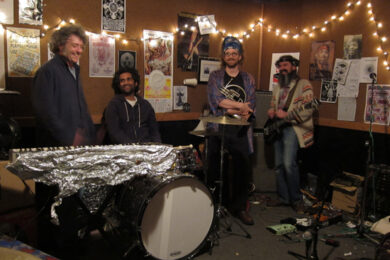Even if he’d never recorded again following the dissolution of
Brainiac, John Schmersal’s place within the annals of American
underground rock would have been guaranteed. Schmersal played on the
Dayton, Ohio noiseniks’ two finest albums – 1994’s Bonsai Superstar
and 1996’s Hissing Prigs In Static Couture – along with their final
mini-LP, 1997’s Electro Shock For President, his skronky and hectic
guitar a perfect match for the group’s brilliantly twisted
synthscursions, Eno-esque vignettes and exhilaratingly kinky abuse of
the punk/pop form.
After Brainiac split following the tragic death of frontman Timmy
Taylor, Schmersal withdrew from the scene, releasing an album of
charmingly frayed indie-rock under the name John Stuart Mill. However,
he soon resurfaced with a new group, Enon, first collaborating with
Rick Lee and Steve Calhoon of New York underground group Skeleton Key,
before hooking up with Toko Yasuda (formerly of The Lapse and The Van
Pelt) and Matt Schulz for the trio’s most stable line-up. Utilising
samplers and avant techniques in addition to a mercurial gift for
melody and an antic desire to fuck with the form, Enon fired off a
series of excellent LPs – begin with 2000’s Believo! and 2002’s High
Society, if you’re curious – before going silent towards the end of
the last decade.
Lately, Schmersal’s been most visible working alongside Dan Snaith as
a component of Caribou’s live set-up. But 2014 spoils us with debut
albums from two new Schmersal projects: the inspired and brilliantly
broken sample-rock of Crooks On Tape, reuniting John with Skeleton
Key’s Rick Lee, and the charming, gently psychedelic pop of Vertical
Scratchers, pairing Schmersal with San Franciscan Christian Bealieu.
Simply put, it’s a great time to be a fan of this underrated auteur of
left-handed pop and bejewelled sampler noise – and an even greater
time to discover his work, if you’re not already a disciple.
To commemorate his return to writing and recording his own tuneage,
Schmersal spoke to us from his current locale, Los Angeles, in a rare
quiet moment between tours and recording sessions, to discuss his
movements post-Brainiac, in particular his two excellent new bands.
Let’s go back to the earliest days of Enon… What were the origins of
the group? How did you hook up with the guys from Skeleton Key?
John Schmersal: Brainiac was done, and I wanted to do something that
extended from where that band was going – synthesizers, guitar
tunings, futuristic ideas and humour -but also not be afraid to be
more purely melodic at the same time. I already knew Rick and Steve
from a tour Brainiac did with Skeleton Key.
When I moved from Dayton to New York, I knew I really wanted to play
music with Rick, because I saw what he was doing with samplers on his
own time – something that wasn’t being fully utilized in Skeleton Key.
I felt like Rick’s work with samplers was doing something really
unique – it wasn’t about referencing musical sound-bytes in a
nostalgic sort of way, like so many other artists were doing at that
time. It was more about taking a sound that was interesting and
re-contextualizing it in a melodic manner. That was exactly what got
me interested in using samplers in the first place.
After a couple of albums, Rick and Steve moved on and you started
working with Toko and Matt…
JS: After playing for a while as a three piece, we didn’t feel like enough
low-end was always being output, and so we discussed adding a bass
player/ fourth member. In 1999, I did a stint playing on guitar with Les
Savy Fav while they were touring The Cat And The Cobra. The last show
was supposed to be with The Lapse in New York, but they didn’t play
the show.
I ran into Toko a week later, asked her what had happened, and she
told me she had basically quit the band. Since we were looking for a
bass player with something more to offer than just playing bass, I
gave Toko a freshly minted copy of Believo! and she ended up joining
us. Matt joined later, as Mr. Calhoon was not able to commit to the
long-term touring engagements. I knew Matt from Ohio, as he is the
cousin of my friend and former bandmate, [Brainiac drummer] Tyler
Trent. Why did Enon eventually split? We just got to a point where
none of us was interested in proceeding with it anymore.
In the interim between Enon and your new bands, you toured as a member
of Caribou.
JS: And I’m still playing with Caribou. I love Dan [Snaith]’s music,
and it’s been liberating to pour myself into that band. It’s also been
a good challenge, as it’s the first band I’ve played in that doesn’t
always have a fixed format for how a song is interpreted live.
Crooks On Tape sees you reunited with Rick from Skeleton Key – how did
this come about?
JS: Rick and I always remained friends, and occasionally played music
together after he was in Enon. He was already living in Los Angeles
when I arrived there… I think we had been brewing about doing
something new for a while. There’s another Crook, too, Joey Galvan.
The idea with Crooks on Tape was to jump off from the springboard of
how Rick and I first start playing, back when Enon began, in a totally
improvised state. So the three of us would routinely get together
and record everything we did, and not discuss it. Other than pressing
record, incorporating new toys, or occasionally listening back to a
few minutes of it, we were just really trying to have fun, like a band
is supposed to be.
I don’t think we were terribly concerned about what it would turn
into. But we knew from past experience that our spontaneous nature
meant a lot of good material lost because we weren’t documenting it.
So we just decided to document everything.
Crooks On Tape’s debut, Fingerprint, indulges the more berserk side of
your creativity – the twisted, Prince-meets-skronk avant-pop thing
that first drew me to Brainiac. Vertical Scratchers’ Daughter Of
Everything, meanwhile, seems to play harder to your melodic instincts
- a great, tuneful breeze of a set. Did you make a conscious decision
to pursue two projects that explored different sides of your muse and
music?
JS: With Crooks On Tape, we just wanted to do something that
interested us, and that pretty much meant ‘anything goes’, while
avoiding the most basic tropes of playing guitar, bass, and drums in a
typical song oriented format. As far as Vertical Scratchers is
concerned, I wanted to take that common trope and instead use it as a
limitation. One band [Crooks On Tape] is allowed to do anything other
than be utterly basic, in that way, while trying to be captivating.
The other [Vertical Scratchers] is trying to use the most simplistic
and overused trope structure in music – guitar, bass, drums – and keep
it interesting, from a song perspective. To me, the division between
the two projects is very deliberate, if not totally obvious.
What’s the story with Vertical Scratchers? How did you hook up with Christian?
JS: Christian is a San Francisco guy, but he was living in Los Angeles
for a year, and I met him at a party. He hadn’t played drums in a band
since the 90s, so we just got together for fun and played.
We shared the same mindset about doing a band like a simple machine.
We refused to get a practice space, so I’d just go pick him up in my
van, and we’d work out songs in a really rudimentary way inside of the
van, while it was parked on the street. I really hate commercial
practice spaces and neither of us had a place to play loud and
amplified so, we just decided we would use this as our device.
We’d just put together songs in a really simple ‘muscle-memory’ sort
of way, like cramming for a test in your head. That way it wasn’t
about relying on amplifiers or effects or anything. When a song is
good, it should translate in the most simple way, like on an acoustic
guitar. I just fed him ideas that I had and we pursued what was
interesting to the two of us on an un-amplified guitar, and if it
worked there then it would work when we got into a room with
amplification.
Robert Pollard of Guided By Voices cameos on ‘Get Along Like U’ on the
Vertical Scratchers album – how did that come about? An example of
some old school Dayton rock scene camaraderie?
JS: I think I’ve asked Bob a few times before about collaborating, and
it just finally materialized. I’ve know him since I lived in Dayton
back in Brainiac. I just felt like he was the singer of that song, you
know? I sent it to him and he was into it. What can be said about Bob?
He’s so prolific that he’s often overlooked. Bob is like air – I feel
like most people take him for granted. He’s written so many incredible
songs, and he’s one of my favorite voices.
What’s it like having two groups on the go at once?
JS: What is it like? Very busy. I’m still playing with Caribou, and I
filled in for Eli Janney over the past year in Girls Against Boys
while they were playing reunion shows. Both Crooks On Tape and
Vertical Scratchers release records and go on tour this year, and
then, in the summer, I start touring with Caribou again. Kids, don’t
try this at home.
But these things go in ebbs and flows… This time last year, I was
working on a lot of this music, but I felt more like a librarian or
something. It was a super quiet and mostly introspective kind of time.
I also haven’t released any records in a few years, which was both on
purpose, and also due to the fact that I’ve been seriously touring
with Caribou since 2008. But I really love traveling, so this is the
right occupation for me, and I have my work cut out for me for a
while.
VERTICAL SCRATCHERS TOUR
MAY
Monday 5 – Ramsgate, Music Hall
Wednesday 7 – Leeds, Brudenell Social (supporting The Sonics)
Thursday 8 – London, The Waiting Room
Friday 9 – TBC
Saturday 10 – London, Brixton Windmill




